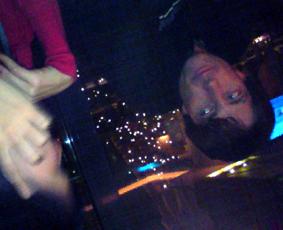A reply from Kim Stanley Robinson to a question from the audience, after his talk on “Science, Religion, and Ideology” at the “Competing Cosmologies, Effecting Worlds: Intersections of Science and Religion” event at the Ecology and the Humanities Institute, Duke University, NC.
There are two lines of thoughts I would like to follow up on in future posts—touching on questions Tim, Siggi, and me often raise in our private discussions, Wavetank posts [RIP], and Ästhetische Gesellschaft video podcasts:
- Would KSR’s speedwalker metaphor (see below) also accommodate the “Acceleration of Acceleration” phase we seem to have arrived at?
- What does all this mean for the future of science fiction? Is it still possible to write science fiction that isn’t fantasy and that plausibly projects our current vectors into a future which a) wouldn’t look ridiculous in two years and b) wouldn’t have to come up with completely new, original sources of dramatic conflict?
The unauthorized transcription of the excerpt that interests me most is mine, as always, and so are any errors or omissions. The clip itself, including his own transcript and tons of other great stuff, was provided by Gerry Canavan, co-organizer of the event. Please check out Gerry’s blog and watch KSR’s whole talk!
I’m looking forward to lively discussions… but first, Kim Stanley Robinson.
Enjoy!
Sure. Well I think it’s very true that we are living in a science fiction novel that we all collaborate on. And it’s because everything that science fiction was about through its historical named period, the twentieth century, has kind of come true. And also we live in a world that is so intensely structured by science and technology that we can’t get out of it. If we were to get out of it, it would still be a science fiction move, the “retreat to the farm.” So it’s hegemonic, you can’t escape it. We’re in that world created by science and technology.
And also there’s this intense sense of futurity, in that if you opened up your laptop or your newspaper tomorrow and it said, you know, “They cloned six South Koreans successfully and they’re all named Kim,” you would believe it, there would be no surprise there. Anything could happen. You know, it could say, well, “We just got a signal from Alpha Centauri, there are intelligent aliens there, they sent us, you know, the code for pi and the Pythagorean theorem.” There’s no reason to disbelieve that, either. So we live in this world of anticipation of strangeness, of change—rapidly accelerating change.
I came through the Atlanta airport today and—you know those speedwalkers that are underneath the various terminals? Well, when I was young there was this famous bestseller, Future Shock by Alvin Toffler. Well, Future Shock… you don’t talk about that anymore, because none of you are shocked. And that’s because the shock comes at the moment when you step on the walkway and you feel the drag between one acceleration and another. At the moment you’re being accelerated to a new speed there’s a little gravity drag on your body, and that’s the moment of Future Shock, 1972 or ’3. And then, when you’re walking with the walkway that’s moving at a different speed, there’s no shock there. You simply are moving at that speed. So now we’re moving at a new historical speed that’s faster than the historical speed was when I was a kid. And that moment was marked by this book Future Shock, and it’s an archaic term, obsolete, because there’s nothing in our experience now… I don’t think there’s anything that could happen that would shock us, because we’re moving at such a fast speed now, and because we’re conditioned by science fiction.
If you have something valuable to add or some interesting point to discuss, I’ll be looking forward to meeting you at Mastodon!


Hmmm…
The science fiction I write actually developed out of my Web site of political and social satire. A running theme in my work is a distrust of the effects of science and technology. This is a theme that will always be appropriate. I find that the current level of public awareness actually helps me, because I don’t have to constantly be explaining technologies to the reader (as past science fiction writers, who could not assume their readers had any scientific or technological literacy, had to).
Hi Ira!
I see what you mean but that, I think, is the problem. Traditionally, the source of conflict in true science fiction would originate from an advanced aspect of society; otherwise it would become pseudo sf or even “skiffy.” But now, these sources of conflict in science fiction have begun to look, well, contemporary. Our advances have accelerated to a pace where it has become really, really hard to think of such “advanced” aspects as a source of conflict that aren’t outdated with the paperback edition.
BTW a follow-up post’s in the pipeline for tomorrow, which might clear things up a bit, and I also touched upon your example of distrust as a possible source of conflict.
I look forward to reading it.
Everything now happens in a fast pace and people have to adjust and cope with it. I think I’d agree that we live in a world that is so intensely structured by science and technology. Advance ideas and gadgets are coming out in a boom!